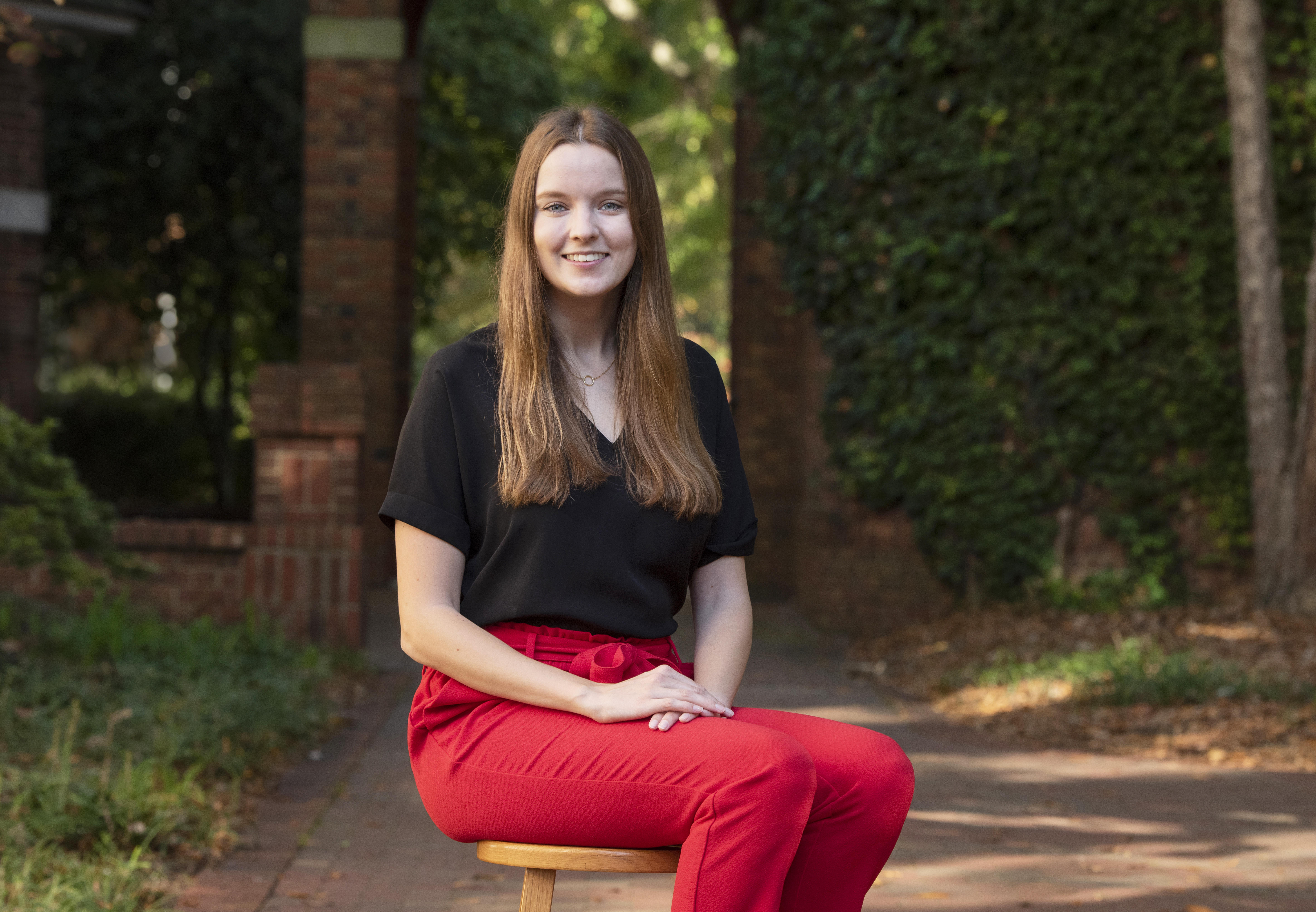Carter Jenkins ’21, under the mentorship of Professor of Psychology Amy Overman, is studying the differences in brain activity patterns in healthy older adults, adults with Mild Cognitive Impairment and adults with Alzheimer’s Disease, as a part of her Lumen Prize research.
The human body is a complex machine with thousands of parts working together to help humans function. Of all those parts, one has always been particularly interesting to Carter Jenkins ’21.
“I just find the brain to be the most fascinating organ, and I don’t think that interest will ever change in me,” she said.
As a high school student in Lynchburg, Virginia, Jenkins dedicated a research project to the study of the brain and Alzheimer’s Disease. In her research, Jenkins realized there is still a lot that researchers don’t know about the cognitive impairment affecting more than 5 million Americans.
Her passion for neuroscience followed Jenkins to Elon, where she will soon graduate with a degree in biology. But before she departs from campus in May, she hopes to leave a mark on the study of the disease. Jenkins is researching the differences in brain activity patterns in healthy older adults, adults with Mild Cognitive Impairment, and adults with Alzheimer’s Disease in a project supported by the Lumen Prize.
The Lumen Prize is Elon’s premier award supporting undergraduate research. Each year, 15 rising juniors are named Lumen Scholars, earning a $20,000 scholarship and the opportunity to work closely with a faculty mentor to complete research that often produces conference presentations and publications.
“I always wanted to do a high-caliber project, and I always wanted to put out really meaningful work,” Jenkins said. “And I thought that Lumen would be the best way to do that.”

Jenkins, an Elon College Fellow, was named one of the 15 recipients of the 2019 Lumen Prize for her research proposal. She selected Amy Overman, professor of psychology and assistant dean of Elon College, the College of Arts and Sciences, as her faculty mentor.
Under Overman’s mentorship, Jenkins is examining brain activity patterns to better understand their relationship to cognitive impairment. Jenkins is using data from hundreds of MRI scans to research regions of the brain that often remain active during the brain’s resting state and have been suspected to have possible links to Alzheimer’s. Jenkins hopes better understanding activity patterns in those regions could potentially help detect a patient’s future risk of an Alzheimer’s diagnosis.
“It’s really meaningful to me to know that I am contributing a piece of the puzzle that is improving quality of life for people who have been diagnosed with this disease,” she said. “I am also hopeful that this project will lead to earlier diagnosis and intervention in any way that’s possible.”
Because of her extensive research in the areas of neuroimaging and Alzheimer’s Disease, Overman was the perfect mentor to guide Jenkins in her research. Jenkins says she anticipated Overman would be the best person to help her reach her full potential.
“I knew that Dr. Overman would be someone who would challenge me, and I wanted that challenge,” Jenkins said. “I thought that she would push me to do my best work and she would push me to learn new skills.”
Among the new skills Jenkins has acquired in her research is the use of graph theory, the mathematical study of networks, to quantify brain organization and function. Jenkins has taken a mathematical approach to understanding the regions of the brain and how they are connected and interact with each other.
An example of graph theory in Jenkins’ work is considering the average number of connections between brain regions, such as the frontal cortex and hippocampus. The functional relationship between the regions would be represented by a graphical link – the shorter the link, the stronger the connection between the two. This unique approach to understanding the brain and Alzheimer’s Disease is no simple task, Overman says.
“Carter doesn’t say this, probably because she’s too modest, but this technique is really only used by advanced graduate students,” Overman said. “So it’s highly unusual to have an undergraduate do graph theoretical analyses, and Carter is doing it now, before she graduates from college.”
Graph theory has helped Jenkins examine the structural connectivity and functionality of brain regions. By better understanding the regions and how they interact with each other during the brain’s resting state, Jenkins hopes to establish a pattern that shows how activity during the brain’s resting state progresses from healthy to Mild Cognitive Impairment to Alzheimer’s Disease.
“It’s really exciting to think that maybe a decade from now you could bring someone in, give them an MRI scan and, if the brain activity patterns indicate it, start them on some medicine or give them cognitive interventions to be able to slow that progression or reduce the risk of development of cognitive impairment,” Overman said.
As she continues her research with Overman, Jenkins is beginning to turn her attention to the future. Her abstract has already been accepted for presentation by the National Conferences on Undergraduate Research, and she hopes to soon present at other professional conferences this semester.
Following graduation, Jenkins plans to take a gap year to work as a medical scribe before beginning medical school in her pursuit of a career as a neurologist or neurosurgeon. She hopes her Lumen Prize project will build a strong foundation for her future career and the future of Alzheimer’s research.
“I’m so interested in the medical implications of my project and how it could actually translate to real treatment options, real intervention and real changes in quality of life for people living with Alzheimer’s,” Jenkins said.



